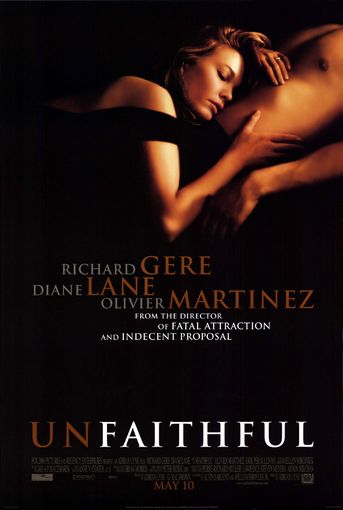The surface of Unfaithful is much like that of a multi-tiered wedding cake. Beneath the handsome exterior lies an “Entenmanns” treat worth no more than $5. This is to say that while the film has the appearance of a deep examination of infidelity, it is merely a well-packaged trifle. Diane Lane plays Connie Sumner, a happily married suburbanite with her loving husband, Edward (Richard Gere), a precious young son, and a beautiful home in upstate New York. While in the city shopping for her son’s birthday party, Connie meets Paul Martel (Olivier Martinez), a handsome book dealer who resides in New York’s swanky Soho. She soon becomes obsessed with the young man and eventually pursues an affair.
In the beginning, she balances out her two lives with great ease. By night, she cooks dinner for her family and asks how everyone’s day was. By day, she releases her inner animal with Paul. The balance soon becomes a rickety seesaw as her husband notices little clues and eventually enlists a private eye (Dominic Chianese) to follow his wife. As her obsession deepens, it becomes more obvious to her husband what is going on.
Unfaithful plays out exactly as you might expect, with a chance encounter, a mysterious loner whose “come-hither” accent is a powerful draw, and a lengthy build-up to self-destruction. Yet it is all done with so much style that even though actions can be seen coming miles away, they arrive with such flavor. The film is shot in a rich brown overtone that creates a smooth and seductive sensation, like a delicious piece of chocolate.
The film takes the opportunity to ask what a person is willing to sacrifice in exchange for some primitive excitement. The opening shot paints a pleasant picture of Connie’s lifestyle, fading in and out over her beautiful home, a serene lakeshore, and then with a standard morning in their household. This setup prepares for the viewer for what they, and Connie, may soon lose.
Why would Connie all but give up her life for the sleekly seductive Paul? We never learn. Like the clues given to Connie’s husband, the viewer is provided with only slight hints as to her past behavior. It is done so subtly it is hard to tell if it is meant to be provocative or purely accidental. At one point in the film, Connie is sidetracked by some friends before she is supposed to meet Paul and ends up having lunch with them at a Café on the same block as his apartment. Paul enters the café regardless and lures Connie into the bathroom for some pre-meal exercise. During her absence, Connie’s friends comment on how stunning she looks for her age, leading one of them to say something along the lines of “her backside being in the same place it was in college.” Cut directly to a shot of Lane’s rear-end being pushed up against the bathroom wall. While this portion is played for laughs, it lead me to wonder about her past. This editing decision implies exactly where she was in college.
Though Lane is the one who truly leads me to these questions. She is enigmatic as the woman who has it all and is prepared to throw it all away. Her playful deceit leaves us to wonder if she should be getting away with any of this. Also of interest is the against-type casting of once-heartthrob Gere, no longer the Gigolo, as the oblivious husband. Fitted with nebbishy sweater-vests and sharp glasses that close in on his eyes, Gere is convincing in a role that he most likely would have not taken even five years ago. Left on the side to figure out what is going on, he is the most sympathetic character in the film, and when he is hurt, we are too.
After a significant plot development around ninety minutes in, the film begins to wonderingly aimlessly before finally settling on an acceptable, but nowhere near stimulating close. Director Adrian Lyne, who specializes in sexual weaponry with films such as Fatal Attraction and the controversial Lolita remake, puts us in the same position as the characters. Neither Edward nor Connie know quite what to make of the affair. The audience is left feeling the same.
Your Daily Blend of Entertainment News

